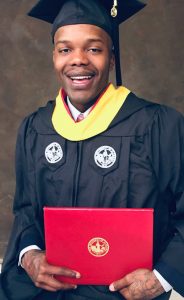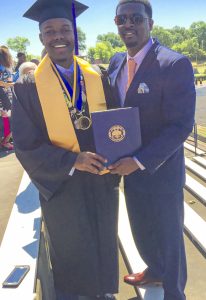Chicagoan Aims to Replicate Mentor’s Impact in Childhood Community
By David Miller
April 28, 2020

Devon Kelly has completed his MSW degree.
Devon Kelly carries his neighborhood wherever he goes.
A Chicago native and son to a single mother, Kelly watched many of his childhood friends wind up in prison or perish to violence. As a youth, he too was “caught up” in the trappings of his neighborhood, resulting in several “run-ins with the law.”
Rather than succumb to peer influences or rely on escapism to cope, Kelly would learn a straighter, more meaningful path to a safer, more prosperous future: education.
Kelly’s depth and candor when discussing his childhood quickly pivots to Dr. Perry L. Benson, who mentored both Kelly and his brother when they were children. Benson, a prominent youth mentor and community advocate in both Chicago and Champaign, Illinois, became Kelly’s role model for academic achievement, which eventually led Kelly to pursue an MSW degree at The University of Alabama’s School of Social Work.
Kelly was 11 when he first met Benson, who helped show Kelly how to get criminal charges adjudicated and expunged from his record.
“I got to see the other side of what life can be,” Kelly said. “Even after the [mentoring] program ended, Dr. Benson stuck around in our lives. If it were not for his influences, I don’t know where I would be.”
Though Kelly has always aspired to replicate Benson’s impact in his neighborhood, Kelly’s plan for it wouldn’t materialize until enrolling in the School of Social Work, which has equipped Kelly with the tools to strategize his advocacy and reformation efforts in his hometown.
Kelly will earn his MSW in May and plans to go into practice, but, ultimately, he hopes to use the same education-based approach to influence youth in Chicago.
His non-profit aspirations will focus on after-school programs, and eventually a group home.

Kelly with mentor, Dr. Perry L. Benson, during Kelly’s graduation from Stillman College.
“Specifically, I want to help single parents while their children are released from school, to give kids things to do,” Kelly said. “The way I envision it: when a single mom is still at work at 6, the children will have a safe place to play video games, to learn, to study, and have supervised time, and to hopefully decrease the chances they have a run-in with the law.”
Creating a diversion is paramount, because “breaking the law” can be a byproduct of poor decisions or by a flawed criminal justice system. Kelly said that, while he was imprisoned on charges that “stemmed from me hanging around the wrong crowd,” one of his charges was the result of mistaken identity, to which a public defender persuaded him to plead guilty.
“After my mother, grandmother, and grandfather did time in federal prison, I decided to go to college,” Kelly said. “I got tired of being stuck in the same environment and knew that educational avenues would allow my mind to grow.”
Kelly hopes his future for community advocacy can reduce the “urges” youth have to commit crimes due to living in poverty. While in practice, he’ll start his outreach with a T-shirt company aimed at “motivating and encouraging the youth to commit to legal activities to earn an income.”
And while earning his MSW and having a personal motivation have readied him ready for the challenges of non-profit work, Kelly said the responsibility of being a first-generation scholar is a daily reminder of the lofty expectations he’ll face.
“I used to look at my education journey as a burden,” Kelly said. “With my family knowing I was a first-generation college student, they would come to me for different life advice. It sounds unbelievable, but I know some people that don’t know how to complete a simple Google search. Some of my elders don’t know how to read.
“But I learned to adapt to this role, and I take pride in this opportunity to be a positive example.”